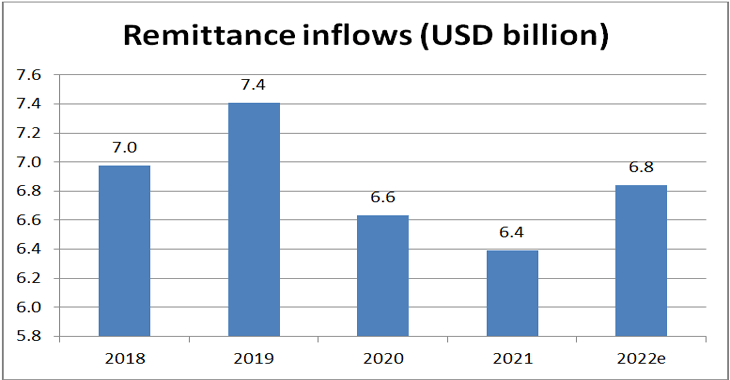UNDP recommends remittances
be directed towards development
Crisis turns inbound transfers into a safety net
| Share |
|

|
|

|
|
|
|
The role of remittance inflows has shifted from developing human capital to meeting basic needs following the outbreak of the crisis with 72 percent of recipients using remittances to sustain their lifestyle or make minor changes, according to The Increasing Role and Importance of Remittances in Lebanon, a report released by United Nations Development Programme (UNDP).
“Before the crisis, remittances were used by households to invest in building human capital, such as health and education. Following the outbreak of the crisis, the role of remittances has changed. They are now primarily used to meet the basic and survival needs of recipient households. These needs include food, rent, and electricity bills. Today, remittances in Lebanon serve as a social safety net for these households,” the UNDP said.
According to Melanie Hauenstein, UNDP Resident Representative in Lebanon, very cheap global digital solutions for transferring money exist but they are not currently activated in Lebanon due to the banking and financial crisis and the difficult economic situation in addition to the lack of required regulations and laws. “This is the reason why expat transfers to Lebanon are often much more expensive than the cost of transfers to other countries. This is because there is less competition,” she said.
The average cost of sending remittances to Lebanon stands at 11 percent, which is significantly higher than the global average of six percent, and also exceeds the average in other countries in the Middle East and North Africa (MENA). “As a result, there has been a shift from formal to informal channels, such as in-person cash handouts, for receiving remittances. These informal inflows are captured by the formal Central Bank figures and constitute around 70 percent of the inflows during the crisis, based on estimations of airport flows of Lebanese expatriates,” the report said. According to Hauenstein, expats won’t have to bring money in suitcases when they can resort to cheap registered digital transfers which can also be tracked and allow the enforcement of accountability.
Lebanon’s remittance-to-GDP ratio reached close to 38 percent in 2022, the highest in the MENA region. This reflects more a shrinking GDP rather than an increase in remittances. Lebanon, despite its size, is ranked as the MENA’s third largest recipient of remittances in terms of value after Morocco and Egypt.

Source: World Bank-KNOMAD
The UNDP recommends measures to tap the substantial size of remittances and the strong connection between the diaspora and Lebanon in order to channel these inflows into economic development. There is an opportunity to channel these inflows into investment in local development and recovery initiatives and to use them to reverse development losses, the report said.
The required measures include developing a transparent and coherent measurement of remittances, restoring the confidence of expatriates in the economy, strengthening the basic infrastructure to create an enabling business environment for investors, allowing alternative means to facilitate transfers such as digital finance, reducing transfer fees to encourage transfers through official channels, and investing in diaspora bonds once trust is restored.
“Policymakers and financial institutions may consider investing in diaspora bonds. These bonds are usually promoted as ‘an alternative to borrowing from the international capital market, multilateral financial institutions or bilateral loans from Government’. Such an instrument could provide expatriates with attractive interest rates or deposit guarantee schemes so that they are encouraged to invest in Lebanon and raise the sense of patriotism among the diaspora. Several countries, such as India and Ethiopia, managed to mobilize development financing using diaspora bonds,” the report said.
Date Posted: Jun 09, 2023
| Share |
|

|
|

|
|
|
|